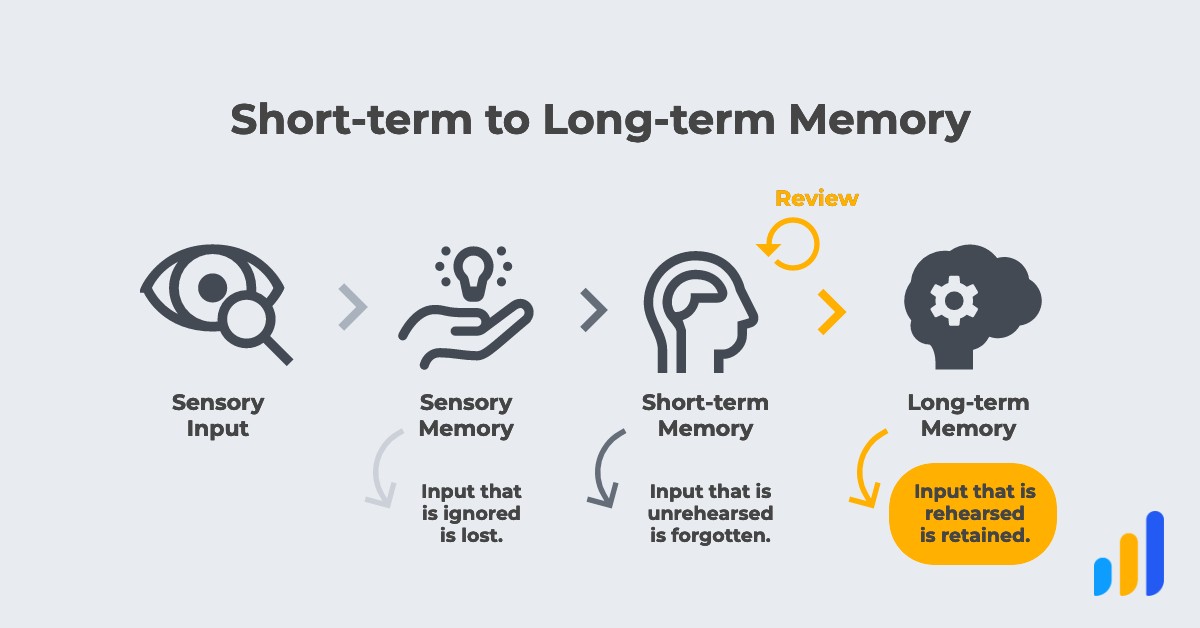
Using Retrieval Practice to Boost Learning Retention
Practice makes perfect. But do your learners ever practice learning?
Your learners come to you to gain skills and broaden their knowledge base, and as an online instructor, you’re committed to helping them achieve that goal. However, in many ways, the learning habits we built as students in grade school—and the teaching practices we absorbed from our teachers—don’t lead to effective learning outcomes for adults. Creating effective and rewording courses for adult learners therefore means focusing on efficient teaching strategies.
In recent years, one of the most important new discoveries in the science of teaching has to do with the “testing effect,” or the way in which running mock tests or practice quizzes helps learners retain information more effectively than repeated review sessions. This is great news for educators and learners alike, but taking advantage of this for your e-learning course will mean re-thinking what it means to administer tests—and what to do with the results.
Testing isn’t all about assessment.
For most of us, throughout our time in school, tests were a thing of dread. Taking was usually a high-stakes endeavor that could have consequences in your ability to move on in a course. Apart from being a nasty blow to the ego, failing a test or scoring poorly could also mean extra hours spent with a tutor, or failure to enter into a desired study program.
In short, years of traditional education have conditioned most of us to view tests only as a form of assessment. Accordingly, forming “good study habits” was all about reviewing material repeatedly before a test so as to avoid any incorrect answers.
But what if they were a learning tool instead? This is, in effect, what retrieval practice is all about.
Retrieval practice, or: the art of remembering.
The theory behind retrieval practice turns test taking on its head. Instead of tests being a tool educators use to measure how much knowledge a learner has gained, tests can themselves become the means by which learners attain knowledge. If mastering a subject matter largely involves the ability to retrieve that knowledge when required, then practicing retrieval can help improve mastery.

In retrieval practice, rather than devote study time to reviewing information they’ve already covered, learners are given a practice test to see how well they can recall that information in a low-stakes scenario. In repeated controlled experiments, learners who take a mock test perform better in subsequent assessments than learners who were given time to review material a second time but were not given a test.
It’s important to note that this is not the same as “teaching to the test.” The goal is neither to train learners in test-taking techniques that can improve performance, nor is it to focus practice questions solely on questions that might appear on an exam. Instead, the purpose of retrieval practice is to improve real mastery, so that material stays with a learner long past the end of their course.
Successful recall is essential for learning—but even guessing shows improvements.
Of course, even on a mock test learners will make mistakes. This is the point of performing them in a low-stakes scenario, where making mistakes doesn’t have consequences. When learners leave answers, immediate feedback on whether their answer was right or wrong—including a supporting explanation sentence of the correct answer—is essential for helping learners improve their recall.
It probably isn’t a shock to hear that learners who aren’t able to successfully recall information do not perform better on later tests. This is why sentence explainers are helpful after both right and wrong answers. However, one surprising discovery is that even guessing at the correct answer can help learners recall the correct information later.
One explanation for this is that uncertain learners who are not confident in their answer may feel like they are “guessing” only to discover that their guess was correct. Similarly, learners who guess at answers in practice tests may be drawing on related information to help recall the correct answer. They may get it wrong, but the process of getting their might have been partially correct. Lowering the stakes of a practice test encourages learners to go with their gut, and the immediate feedback lets them quickly discover which instinct was right and which was wrong.
Short answer, fill-in-the-blank, or multiple choice>? Take your pick.
Many resources and much discussion have gone into trying to determine which questions are most effective on essays for assessing student subject mastery. However, one surprising result from recall training is that none of these methods are noticeably more effective in improving recall than another. While a short answer or essay question may be more effective in an exam for assessing a learner’s true mastery, in a recall practice scenario multiple choice questions are just as effective.
This is great news for online educators, as multiple choice questions can be automated. This means that, if you’re using LearnDash, you can give your learners some recall practice in the form or micro quizzes at the end of each module, with no extra grading work on your part. You can even create bonus practice quizzes for learners to take on their own, or send out regular micro quizzes to re-engage learners who haven’t signed in in a while.
Practice testing isn’t the only way to improve recall for long-term learning.
While it’s easy to think of recall practice as being all about testing, remember that any time learners are retrieving their knowledge and putting it to use is a form of recall practice. There are plenty of other tools educators can use in their courses to aid recall and retention, from knowledge mapping to class discussions.
The key takeaway is that helping learners reconstruct knowledge is the key to long-term retention. Learning is about more than studying the same material over and over again. It’s about putting that knowledge to practice. By helping your learners improve their recall skills, you do just that.

LearnDash Collaborator
@LearnDashLMS






